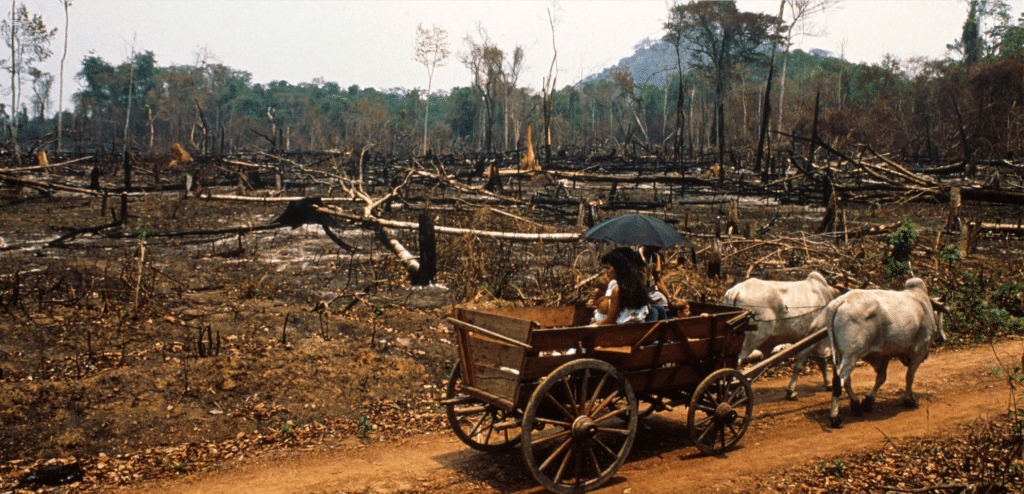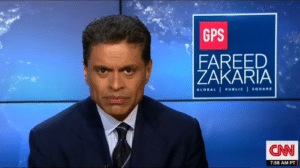 I watch Fareed Zakaria GPS on Sunday mornings, religiously. You’d be hard-pressed to find a show that presents more informed discussion on issues of the day anywhere on TV. This became even more the case after the ignominious demise of my favorite interview and talk show, Charlie Rose.
I watch Fareed Zakaria GPS on Sunday mornings, religiously. You’d be hard-pressed to find a show that presents more informed discussion on issues of the day anywhere on TV. This became even more the case after the ignominious demise of my favorite interview and talk show, Charlie Rose.
Zakaria ends each episode with a GPS challenge. It’s usually a brain-teaser question about a geopolitical issue or event. Evidently, the mockery President Trump has been making of calls to ban plastic straws provoked Sunday’s:
According to a new scientific study, what is the most ubiquitous manmade pollutant, plastic straws, cigarette butts, plastic bags or food wrappers?
 The answer is cigarette butts. I knew this — as I will show below. But Zakaria elaborated in part as follows:
The answer is cigarette butts. I knew this — as I will show below. But Zakaria elaborated in part as follows:
[S]ome 4.5 trillion cigarette butts are tossed out around the world each year [releasing] toxicants into the environment from nicotine to formaldehyde. And the filters are made of a kind of plastic that will persist in the environment for years, possibly decades.
To make matters worse, these pollutants aren’t just unsightly … they actually reduce plant growth, so even more reason to plant those trees and not to smoke.
As I watched him elaborate, two thoughts came to mind:
The first pertained to the growing phenomenon of planting trees to combat deforestation and climate change. Wangari Maathai of Kenya won the Nobel Prize in 2004 for her one-woman crusade to promote “sustainable development, democracy and peace.” She pioneered the idea of “thinking globally but acting locally.”
Accordingly, her Green Belt Movement will prove far more constructive for global development than China’s Belt and Road Initiative. And, for her, nothing is more helpful in this respect than planting trees wherever possible.
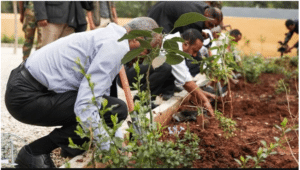 Professor Maathai died in 2011. But her crusade inspired initiatives to plant trees across the globe, including this very timely one:
Professor Maathai died in 2011. But her crusade inspired initiatives to plant trees across the globe, including this very timely one:
Ethiopia has planted more than 350 million trees in a day, officials say, in what they believe is a world record. Prime Minister Abiy Ahmed is leading the project, which aims to counter the effects of deforestation and climate change in the drought-prone country. …
The current World Record for planting trees in a single day is held by India, which used 800,000 volunteers to plant more than 50 million trees in 2016.
(BBC, July 29, 2019)
The second thought that came to mind pertained to my own one-man crusade. It involves getting people not just to quit smoking but, more to the point, to stop littering those unsightly cigarette butts everywhere from sidewalks to forests (where they too often ignite wildfires).
Here, for example, is an excerpt from “PSA: Stop! You Cigarette Litterbugs.” June 10, 2015:
____________________
You know you’ve come a long way, baby, when you can say there’s not a single person in your circle of friends who smokes … cigarettes.
Frankly, I’m always taken aback these days when I happen upon someone inhaling suicidal cigarette smoke anywhere in the United States. I don’t know why it’s any more socially acceptable for a woman to be seen sticking a cigarette in her mouth than it is for one to be seen sticking a needle in her arm.
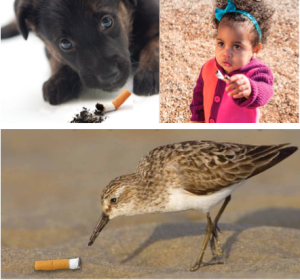 This brings me to the latest anti-smoking PSA.
This brings me to the latest anti-smoking PSA.
Unlike previous PSAs, which targeted second-hand smoke, this one targets the toxins vulnerable creatures (such as children, fish, dogs, and birds) unwittingly inhale from discarded cigarette butts. Ads for this PSA began rolling out in the DC Metro Area recently – complete with this damning script:
Cigarette toxins get into more than just your lungs. Tobacco litter is not just an eyesore; it’s a poison to animals that ingest it.
Cigarette litter harms every living thing – no butts about it.
(NoTobaccoLitter.com)
I was in the vanguard of those protesting against smokers blithely littering sidewalks everywhere with their butts. I refer you to the very personal story I shared in “Smoking Litterbugs,” May 20, 2013.
____________________
Incidentally, it is as much a fallacy to think e-cigarettes are less hazardous to the environment as it is to think they are less harmful to your health.
JUUL cartridges, or pods, are also single-use plastic products. … Single-use pods may end up as litter, compounding the issue of tobacco product litter. …
E-cigarettes, like JUUL, can leak heavy metals and residual nicotine into the environment.
(The Truth Initiative: Inspiring Tobacco-Free Lives, April 23, 2019)
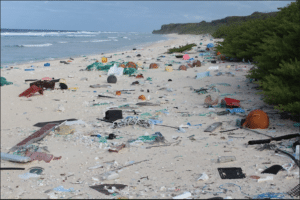 Meanwhile, here but for the grace of God lies the fate of some of the most beautiful Islands in the world (like those of Hawaii and The Bahamas):
Meanwhile, here but for the grace of God lies the fate of some of the most beautiful Islands in the world (like those of Hawaii and The Bahamas):
Henderson Island is an uninhabited coral atoll that lies almost exactly halfway between New Zealand and Peru, with 5,500 kilometres (3,400 miles) of ocean in either direction.
Despite its extreme isolation, a freak confluence of geography and ocean currents means Henderson has one of the highest concentrations of plastic pollution on the planet.
‘We found debris from just about everywhere,’ said Jennifer Lavers, an Australian-based researcher who led an expedition to the island last month.
(Agence France-Presse, July 30, 2019)
As indicated in my excerpt above, it is disheartening to read reports about the increasing number of fish and fauna that are ending up dead from stomachs filled with plastics.
That said, I cannot overstate the thanks and admiration I have for the many environmental crusaders who do far more than publish commentaries from comfortable abodes.
Standing up for the Earth is a dangerous pursuit. A devastating tally released Monday counts 164 environmentalists killed for their efforts in 2018. And that number is probably an underestimation.
(HuffPost, July 29, 2019)
Ironically, given its record for planting trees, India is probably the most dangerous place for environmentalists to live. But nothing is more ominous in this respect than the countervailing force the following portends:
Brazil’s Amazon rainforest suffered 88 per cent more deforestation in June than during the same month last year.
It follows a similar rise in May, with the country’s right wing President Jair Bolsonaro favouring development over conservation.
He has been severely criticised at home and abroad for his claims that environmental protection hinders Brazil’s economic growth. Activists have accused him of operating an assault on rainforest conservation.
(The National, July 11, 2019)
Still, in the spirit of the pioneering Maathai, I urge you to think globally and act locally. Encourage family, friends, and co-workers to quit smoking. And plant trees in your neighborhood – wherever possible.
Related commentaries:
cigarette litterbugs…
Climate change…

